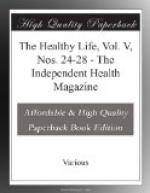12 oz. of solid food and 14 oz. of red wine a day
for a period of something like 60 years, from 38 years
of age to about 97, and had vigorous health during
the time except when he transgressed his rule.
Of course, he was not a hard physical worker—i.e.
he did not do the work of a navvy. But how, in
view of these differences, can M.D. say: “These
quantities were settled by physiologists many years
ago, and no good reasons have since been adduced
for altering them”? It is amazing to me
to read such a statement. It reminds me of a
statement by a distinguished physician in London
during last year to the effect that we could not give
a growing schoolboy too much food—we could
not over-feed him. My opinion, on the other
hand, after a long experience, during which time my
eyes have not been shut, is that the large majority
of the diseases of humanity are due to mal-nutrition
and that the form of that mal-nutrition is over-feeding—not
under-feeding. This opinion should be taken
for what it is worth. But to test it we should
ask ourselves: What is the reason for the necessity
to take food into the body? Is it to give strength
and heat to the body? Or is it to restore the
waste of the body sustained by the action on it of
the force of life or zoo-dynamic which inhabits it?
The demands for food will vary and vary much according
to the way in which we answer this question. As
you allowed me to discuss this question in Healthy
Life in July and August of last year I must not
take up your space by discussing it again. But
the answer we give determines the amounts of food that
we require to take, since, obviously, if the strength
and heat of the body depend upon the food, the more
food we take the more strength and heat shall we
have; while, if the function of food in the adult or
grown body is only to restore the waste of the body,
the question is how much is the waste. There
are various ways in which this question can be answered
and I cannot go into them now; but I say, in my opinion,
the waste is very much less than is commonly supposed.
The body, I take it, is made by zoo-dynamic or the
life-force to be a fit habitation for itself.
The body must waste when the life-force acts through
it, and that waste must be restored by food and sleep,
or the body will die; since things (the body) cannot
act as the medium of conveying forces (zoo-dynamic
or the life-force) without wasting under their action.
But so beautifully has the body been made by zoo-dynamic
that it wastes very little, much less than is commonly
supposed, by the action of zoo-dynamic through it.
Not seeing this, we ingest into the body far more
than is required to restore its waste, and so we fall
ill, for, obviously, if we ingest more than the quantity
necessary for this purpose we choke the body up and
render it inefficient for its purpose as an instrument
for work.
Now this is precisely what seems to me to happen in life. As we are all under the double




